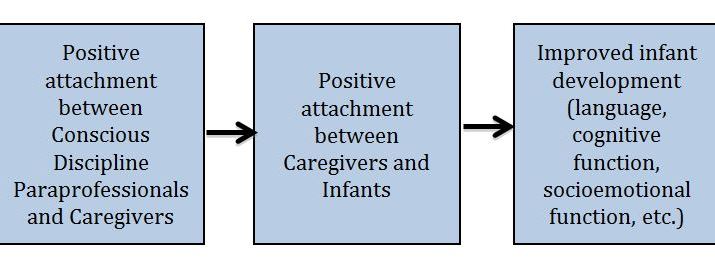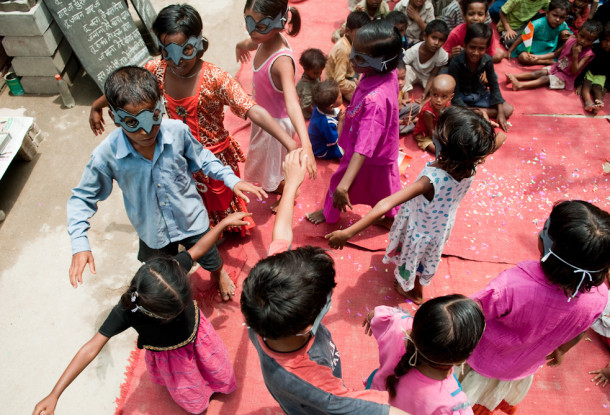Innovation Summary
 Harsh childrearing practices such as corporal punishment, widespread in the Caribbean, are not conducive to optimal neurodevelopment. Violence negatively impacts healthy brain development during the first 1,000 days of life and beyond. Cultural norms that condone and encourage violence influence adult perceptions of child behavior and shape childrearing. Many studies demonstrate adverse effects of violent punishment. Young children, whose brains undergo rapid growth, are most at risk. Imaging studies show reduced gray matter in persons exposed to harsh punishment as children. [1] Implications of the effects on brain development are dire; educational and economic consequences in a globally competitive world are of great concern.
Harsh childrearing practices such as corporal punishment, widespread in the Caribbean, are not conducive to optimal neurodevelopment. Violence negatively impacts healthy brain development during the first 1,000 days of life and beyond. Cultural norms that condone and encourage violence influence adult perceptions of child behavior and shape childrearing. Many studies demonstrate adverse effects of violent punishment. Young children, whose brains undergo rapid growth, are most at risk. Imaging studies show reduced gray matter in persons exposed to harsh punishment as children. [1] Implications of the effects on brain development are dire; educational and economic consequences in a globally competitive world are of great concern.
To support child development in the Caribbean, a Conscious Discipline ‘meme’ will be disseminated to show corporal punishment as counterproductive, while working with locally-trusted paraprofessionals to train new and expecting parents on positive parenting practices.
Gallery
Impact
- 1,750 children will have caregivers who received conscious discipline training and education, including hands-on skills designed to have a direct impact on parent-child attachment.
- 1,750 parents and 70 Conscious Discipline Paraprofessionals will receive Conscious Discipline training, and will be able to demonstrate fidelity (i.e., uptake and implementation of knowledge, attitudes, and behaviours) to the program [expected].
The brain is asking three important questions at all times: ‘Am I safe?’ ‘Am I loved?’ ‘What can I learn from this?’ In order to focus attention and problem-solve (learn), the answer to the first two questions must be ‘yes.’
-- Becky Bailey, Founder, Conscious Discipline
Innovation
This innovation proposes to mitigate long-term impacts of corporal punishment, promote positive parent-child attachment, and maximize child potential through a distributed, local, train-the-trainer campaign that focuses on positive discipline. The train-the-trainer model will teach Conscious Discipline Paraprofessionals, who will then travel to communities to regularly meet with new parents and their infants. Conscious Discipline Paraprofessionals will model Conscious Discipline and positive attachment, and support parents to develop their skills in these areas. These Paraprofessionals will be supported by a mobile resource unit that will also travel to the communities to provide further training and resources, and provide high national visibility for the project.
The project will be implemented in three stages:
- The project team will work with the existing Roving Caregiver program in the Grenada Ministry of Social Development and Housing to identify 70 paraprofessionals from villages throughout Grenada. These individuals must be respected within their communities as this will help curtail the problem of trust-building between child development experts and villagers. In addition, they must understand the negative impact of corporal punishment and uphold fundamental principles of Conscious Discipline (CD); be willing to learn and have the capacity to teach CD to others; and must show long-term stability and dedication to their community. After identifying these individuals, now referred to as Conscious Discipline Paraprofessionals (CCDPs), the team will hold intensive training workshops for six months.
- The CCDPs will return to their communities to train new and expecting parents, as well parents of young children, with the support of regular visits by a Conscious Discipline Mobile Resource Support Unit stocked with educational toys and books, and staffed by a CD Project Manager.
- The outcomes measurement system will be implemented while CCDPs continue to provide CD training within their communities. Communities without a CCDP will serve as wait-list controls.
Collaboration
Funders
- Grand Challenges Canada
Key Partners
- George’s University (Grenada)
- Roving Caregivers Programme, Ministry of Social Development (Grenada)
Implementation
Key Drivers
Focus on capacity building by targetting new and expecting parents
Existing Roving Caregiver (RC) Program
A Roving Caregiver program, employing over 90 full time enrichment paraprofessional therapists, already exists in Grenada. The Rovers travel to remote locations to provide enrichment activities for children, but provide little parent support. The project team will work with the RC program to identify paraprofessionals from the villages, relying on their understanding and experience of working with these communities.
Community Conscious Discipline Meme
Creative nature of creating and disseminating a community Conscious Discipline “meme” promotes natural sustainability as it focuses on changing attitude towards punishments from the ground up (i.e. at level of community) rather than the top down ( i.e. laws, professional oversight, enforcement). This part of the program anticipates creating top-down change by changing public opinion
Symbol of Nation-Wide Effort
Community Conscious Discipline Paraprofessionals (CCDP) and their respective villages will receive support from mobile unit team which is anticipated to become a symbol of a nation-wide effort to save brains further ensuring successful implementation of the innovation.
Sustainability Through CCDP Training
Training and supporting CCDP will promote sustainability as these individuals will continue to impart their knowledge even after the grant is completed.
Challenges
Training of Conscious Discipline Paraprofessionals
Ensuring that at least 70 Conscious Discipline Paraprofessionals were trained and met fidelity criteria to be able to teach Conscious Discipline in the community
Recruiting and Maintaining Target Number of Parents
Recruiting enough parents with infants (2,500) and keeping the target number (1,750) involved in the Conscious Discipline training to the end of the study
Evaluation Methods
To determine the effectiveness of the program, targeted outcomes will be compared across the CD-trained parents and caregivers to the wait-list control group.
Out comes that will be measured:
Conscious Discipline Paraprofessionals Knowledge and Uptake – whether or not they can adopt and disseminate the model as measured by quantitative, observable fidelity instruments.
Parent Knowledge and Uptake – will measure change in knowledge, attitude, behaviors, and child-parent interactions through quantitative self-report and observable fidelity instruments.
Children – whether or not children exposed to the intervention show improved cognitive, emotional, and language development for at least 10 months compared to children in a wait list control group, measured by quantitative, observable instruments.
Impact of Innovation
2,500 parents and their infants are expected to be reached through the program, with at least 1,750 completing at least 10 months of regular training sessions. At least 70 Community Conscious Discipline Paraprofessionals will be trained and certified to provide Conscious Discipline training to parents.
Cost
- $250,000 (CAD) – total direct costs to implement the program.
- $100 (CAD) per parent reached (2,500 parents and their infants).
- $142.86 CDN per parent who completes at least 10 months of training (1,750 target number).
References
- Tomoda, A. M., Suzuki, H., Rabi, K., Yi-Shin, S., Polari, A., & Teicher, M. H. (2009). Reduced prefrontal cortical gray matter volume in young adults exposed to harsh corporal punishment. Neuroimage; 47(2), T66-T71.
- Rao, H., Betancourt, L., Giannetta, J. M., Brodsky, N. L., Korczykowski, M., Avants, B. B., Gee, J. C. et al. (2010). Early parental care is important for hippocampal maturation: Evidence from brain morphology in humans. Neuroimage, 49, 1144-1150.
Resources
-
Research
-
Instruments & Batteries
-
Conscious Discipline Fidelity Assessment – measures the following key outcomes among caregivers: composure, encouragement, assertiveness, choices, positive intent, empathy, consequences.
-
Infant and Toddler Neurodevelopment Assessment: Intergrowth-21st Neurodevelopment Assessment (INTER-NDA) – gross motor, fine motor, cognitive, language, child behaviour, maternal attention, maternal emotional reactivity.
-
Infant and Toddler Neurodevelopment Assessment: Communication and Symbolic Behaviour Scales Development Profile (CSBS DP) – language predictors: 1) emotion and use of eye gaze 2) use of communication 3) use of gestures 4) use of sounds 5) use if words 6) understanding of words 7) use of objects.
-
General Health Questionnaire – Measures parent’s overall well-being through 12 self report items.
-
Parent-Child Interaction: Home Observation for Measurement of the Environment, 3rd Edition, Infant-Toddler version (HOME-IT) – Consists of 45 items that assess: (1) Responsivity of the parent to the child; (2) Acceptance of suboptimal behavior and avoidance of restriction and punishment; (3) Organization, including regularity and predictability of the environment; (4) Learning Materials provided to the child; (5) Involvement of parents with the child; (6) Variety in daily stimulation. Eighteen items are based on observation, 15 on interview, and 12 on either observation or interview.
-
Confusion, Hubbub, and Order Scale (CHAOS) – self-report questionnaire of 15 statements completed by parents, designed to assess the level of confusion and disorganization in the child’s home environment.
-
Parent-Child attachment – a Three item questionnaire based on traditional attachment classification: 1) Secure; 2) Anxious-ambivalent; 3) Avoidant – Researcher developed
-
United States Department of Agriculture U.S. Adult Food Security Survey Module – 11 self report questions that examine food security in the household - Household Food Security Module Six-item short-form.
-



